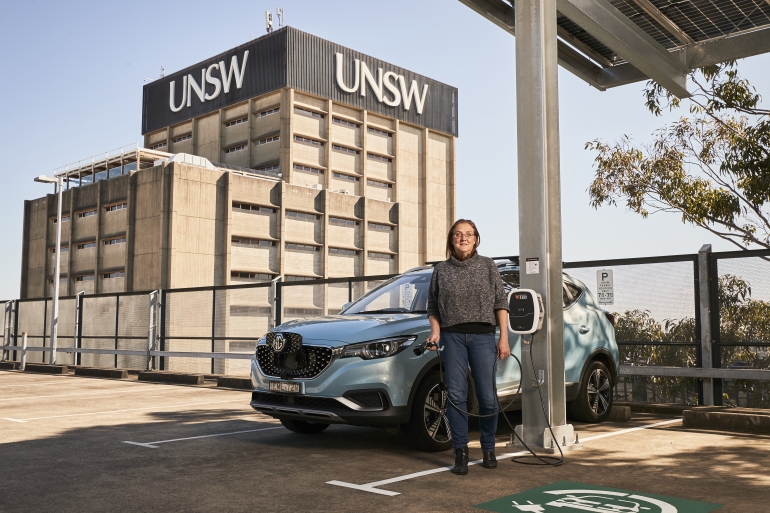Students and staff will now be able to charge up their electric vehicles on campus using renewable energy – thanks to a new solar car park array installed on the rooftop level of UNSW’s Botany Street car park.
Six new electric vehicle charging stations, powered by PERC solar cells that use technology developed at UNSW, have been unveiled and are now available for use. The photovoltaic (PV) panels have bifacial technology, so they generate electricity from light reaching the front and back of the PV module.
The six chargers can be used by students, staff or members of the public who pay to park in the Botany Street car park.
The project has been funded thanks to a $220,000 donation from philanthropist Mark Tidswell, who is a strong advocate of renewable energies and long-time financial supporter of the School of Photovoltaic and Renewable Energy Engineering (SPREE).
The solar array will also be used as a teaching tool for SPREE students with all revenue generated by these EV chargers flowing back into the School.
Professor Alistair Sproul, Head of the School of Photovoltaic and Renewable Energy Engineering, said, “Mark is very enthusiastic about renewable energy and has been a wonderful supporter of our School. His support and enthusiasm for this project has been crucial and we thank him very much for funding this project.
“We also thank UNSW Estate Management for partnering with us to install this solar array and EV charging station which will provide our students and researchers with valuable data.”
This project contributes to UNSW achieving its sustainability goals. Solar photovoltaics and electric vehicles are ideally placed to assist Australia to transition to a clean and sustainable future.
Estate Management is delighted to be a part of this project. Jeff Peers, Chief Technology & Infrastructure Officer, said, “We are proud to support undergraduate and postgraduate students through providing infrastructure that assists the University’s transition to renewable energy and sustains the research being done in this area.”
Usage data will be collected to help inform plans to expand the project in the future. “We hope to install even more solar-powered EV charging stations both in the Botany Street car park and further across campus,” said Mr Peers.
About the electric vehicle charging stations
The charging stations are located on the rooftop level of the Botany Street car park. Currently we have six dedicated parking spaces reserved for charging electric vehicles only. Signage is located in the car park to direct users to the rooftop.
The solar array system is expected to generate around 100 MWh per year – roughly enough to charge 1800 standard range Tesla model 3 cars.
The system has six Level 2 electric vehicle charging stations of 7.2 kW each. These chargers typically add up to 40km of range per hour of charging and can be used to top-up your car while studying or working on campus or leave for the whole day for a full charge.
Costs for charging are $0.25/kWh between 7am-10pm Monday to Friday, and $0.15/kWh at all other times.
The usual parking fees for students, staff and visitors also apply via a vPermit or the CellOPark App.
The charging stations are connected to the Chargefox EV system and managed by Estate Management. Users will be required to download the Chargefox App and set up an account to pay for charging.
More information
View the electric vehicle charging stations information on the Estate Management website.
